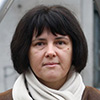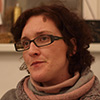 Fouad Asfour, art writer, editor, and linguist, works in collaborative frameworks on publications, exhibitions, performances, and art exchange projects. He has worked for various art institutions and research projects, was part of the documenta 12 magazines project, and is a member of the artist collective the Dead Revolutionaries Club. In 2011 he initiated the independent publishing project Pole Pole Press and is the co-founder of the self-organized student support initiative Thekgo Bursary (now in collaboration with Canon Collins Trust). He holds an MA in linguistics from Vienna University and is currently completing an MA in creative writing at Rhodes University in Grahamstown, South Africa. He lives between Johannesburg and Vienna. In 2008 he was a grant recipient of the Igor Zabel Award for Culture and Theory.
Fouad Asfour, art writer, editor, and linguist, works in collaborative frameworks on publications, exhibitions, performances, and art exchange projects. He has worked for various art institutions and research projects, was part of the documenta 12 magazines project, and is a member of the artist collective the Dead Revolutionaries Club. In 2011 he initiated the independent publishing project Pole Pole Press and is the co-founder of the self-organized student support initiative Thekgo Bursary (now in collaboration with Canon Collins Trust). He holds an MA in linguistics from Vienna University and is currently completing an MA in creative writing at Rhodes University in Grahamstown, South Africa. He lives between Johannesburg and Vienna. In 2008 he was a grant recipient of the Igor Zabel Award for Culture and Theory.
 Izidor Barši holds a degree in philosophy and sociology of culture at the Faculty of Arts in Ljubljana. He has contributed texts on philosophy, art and architecture to Tribuna, Mladina, Delo, Praznine, and Emzin. Since 2010, he has been a regular contributor at the culture and the humanities desk at Radio Študent; since 2013 he is a member of the editorial board of Šum magazine. Between 2014 and 2015 he was the editor of Tribuna magazine. In addition, he has helped organise and lead a few theoretical reading seminars focused on philosophy and theory at the Museum of Contemporary Art, Moderna galerija, and Rog Factory.
Izidor Barši holds a degree in philosophy and sociology of culture at the Faculty of Arts in Ljubljana. He has contributed texts on philosophy, art and architecture to Tribuna, Mladina, Delo, Praznine, and Emzin. Since 2010, he has been a regular contributor at the culture and the humanities desk at Radio Študent; since 2013 he is a member of the editorial board of Šum magazine. Between 2014 and 2015 he was the editor of Tribuna magazine. In addition, he has helped organise and lead a few theoretical reading seminars focused on philosophy and theory at the Museum of Contemporary Art, Moderna galerija, and Rog Factory.
 Maja Breznik is sociologist and a researcher at the Peace Institute. She studied at the Ecole des hautes études en sciences sociales in Paris (1989) and at the University of Ljubljana, where she also finished her PhD (2001). She received a fellowship at The Institute of International Education/Arts International (New York, 1992), and from 2002 to 2004 she was a researcher at Università degli studi di Padova, Department of Sociology. So far she has coordinated or participated in 15 research projects, including from the field of cultural policy. She has published several books: Obrt in učenost (Artisanry and Erudition, 2003), Kulturni revizionizem/Cultural Revisionism (2004), Kultura danajskih darov (The Culture of Danaan Gifts, 2009), Posebni skepticizem v umetnosti (Specific Scepticism in the Arts, 2011), Za napisom Nezaposlenim vstop prepovedan (Behind the Notice “No Admittance Except on Business”, 2014), and many chapters and articles. Lately she has been focusing on the issues of labor rights and private labor markets.
Maja Breznik is sociologist and a researcher at the Peace Institute. She studied at the Ecole des hautes études en sciences sociales in Paris (1989) and at the University of Ljubljana, where she also finished her PhD (2001). She received a fellowship at The Institute of International Education/Arts International (New York, 1992), and from 2002 to 2004 she was a researcher at Università degli studi di Padova, Department of Sociology. So far she has coordinated or participated in 15 research projects, including from the field of cultural policy. She has published several books: Obrt in učenost (Artisanry and Erudition, 2003), Kulturni revizionizem/Cultural Revisionism (2004), Kultura danajskih darov (The Culture of Danaan Gifts, 2009), Posebni skepticizem v umetnosti (Specific Scepticism in the Arts, 2011), Za napisom Nezaposlenim vstop prepovedan (Behind the Notice “No Admittance Except on Business”, 2014), and many chapters and articles. Lately she has been focusing on the issues of labor rights and private labor markets.
 Ekaterina Degot is an art writer and curator, Artistic Director at the Academy of Arts of the World, Cologne, and professor at the Rodchenko Moscow School of Photography and Multimedia. In 2014 she won the Igor Zabel Award for Culture and Theory. Her resent curatorial projects include: Report to an Academy, a Non-Academic Symposium, Performative or Otherwise, Pluriversale I, Cologne, 2014 (with David Riff); What Did the Artist Mean by That?, Moscow Museum of Modern Art, 2014 (with Yuri Albert), and Monday Begins on Saturday, First Bergen Assembly, Bergen, Norway, 2013 (with David Riff). She co-edited Post-Post-Soviet?: Art, Politics and Society in Russia at the Turn of the Decade (Chicago University press, 2013).
Ekaterina Degot is an art writer and curator, Artistic Director at the Academy of Arts of the World, Cologne, and professor at the Rodchenko Moscow School of Photography and Multimedia. In 2014 she won the Igor Zabel Award for Culture and Theory. Her resent curatorial projects include: Report to an Academy, a Non-Academic Symposium, Performative or Otherwise, Pluriversale I, Cologne, 2014 (with David Riff); What Did the Artist Mean by That?, Moscow Museum of Modern Art, 2014 (with Yuri Albert), and Monday Begins on Saturday, First Bergen Assembly, Bergen, Norway, 2013 (with David Riff). She co-edited Post-Post-Soviet?: Art, Politics and Society in Russia at the Turn of the Decade (Chicago University press, 2013).
 Kaja Kraner primarily works as a writer of critical, theoretical texts and radio shows in the field of contemporary art. She helps create the programme of Pekarna Magdalenske mreže, is a member of the editorial board of Šum and a co-editor of Art-area, an emission on Radio Študent. In addition, she (co-)leads reading seminars on contemporary art organised by Šum and Neteorit collective. She has focused especially on the relations between art, politics, and theory, as well as on the production conditions of contemporary art. She is currently exploring the concept of the geopolitics of art in the framework of her PhD.
Kaja Kraner primarily works as a writer of critical, theoretical texts and radio shows in the field of contemporary art. She helps create the programme of Pekarna Magdalenske mreže, is a member of the editorial board of Šum and a co-editor of Art-area, an emission on Radio Študent. In addition, she (co-)leads reading seminars on contemporary art organised by Šum and Neteorit collective. She has focused especially on the relations between art, politics, and theory, as well as on the production conditions of contemporary art. She is currently exploring the concept of the geopolitics of art in the framework of her PhD.
 Antonija Letinić is Editor-in-chief of the Internet publication Kulturpunkt.hr (based in Zagreb) and is in charge of other projects run by the organisation Kurziv – Platform for Matters of Culture, Media and Society – such as the educational programme Kulturpunkt’s Journalistic School ‘World of Art’ and programme Criticism – Past, Present, Future. She is one of the founders of the organisation Nemeze – an Association for the Development of Non-Profit Media as well as a member and a president of the organisation Kurziv that runs Kulturpunkt.hr.
Antonija Letinić is Editor-in-chief of the Internet publication Kulturpunkt.hr (based in Zagreb) and is in charge of other projects run by the organisation Kurziv – Platform for Matters of Culture, Media and Society – such as the educational programme Kulturpunkt’s Journalistic School ‘World of Art’ and programme Criticism – Past, Present, Future. She is one of the founders of the organisation Nemeze – an Association for the Development of Non-Profit Media as well as a member and a president of the organisation Kurziv that runs Kulturpunkt.hr.
 Thijs Lijster is assistant professor of philosophy of art and culture at the University of Groningen. He studied in Groningen and New York, and in 2012 received his PhD for his dissertation on Benjamin’s and Adorno’s concepts of art criticism. In 2010 Lijster won the Dutch/Flemish Prize for Young Art Criticism, and in 2015 the NWO/Boekman dissertation award. He has contributed to books such as Conceptions of Critique in Modern and Contemporary Philosophy (2012), Institutional Attitudes (2012), and No Culture, No Europe (2015), and coedited Spaces for Criticism. Shifts in Contemporary Art Discourses (2015).
Thijs Lijster is assistant professor of philosophy of art and culture at the University of Groningen. He studied in Groningen and New York, and in 2012 received his PhD for his dissertation on Benjamin’s and Adorno’s concepts of art criticism. In 2010 Lijster won the Dutch/Flemish Prize for Young Art Criticism, and in 2015 the NWO/Boekman dissertation award. He has contributed to books such as Conceptions of Critique in Modern and Contemporary Philosophy (2012), Institutional Attitudes (2012), and No Culture, No Europe (2015), and coedited Spaces for Criticism. Shifts in Contemporary Art Discourses (2015).